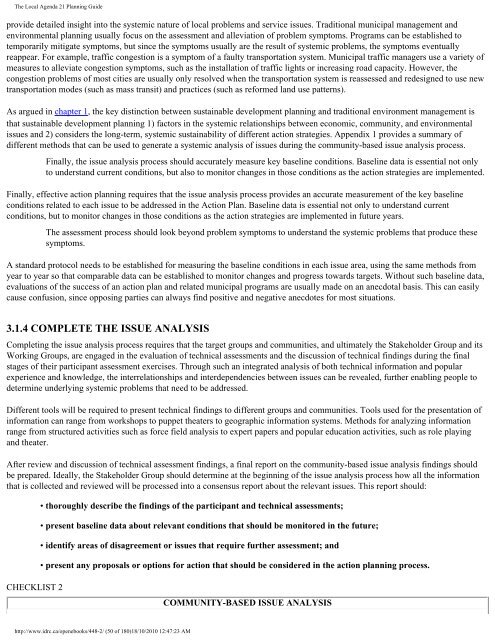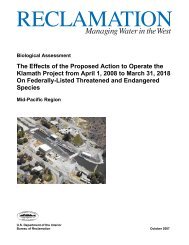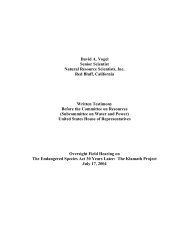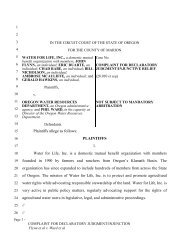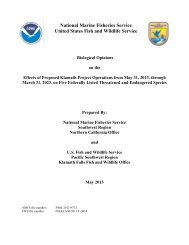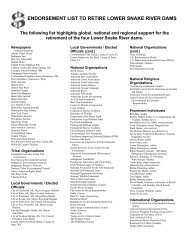The Local Agenda 21 Planning Guide - Democrats Against UN ...
The Local Agenda 21 Planning Guide - Democrats Against UN ...
The Local Agenda 21 Planning Guide - Democrats Against UN ...
You also want an ePaper? Increase the reach of your titles
YUMPU automatically turns print PDFs into web optimized ePapers that Google loves.
<strong>The</strong> <strong>Local</strong> <strong>Agenda</strong> <strong>21</strong> <strong>Planning</strong> <strong>Guide</strong><br />
provide detailed insight into the systemic nature of local problems and service issues. Traditional municipal management and<br />
environmental planning usually focus on the assessment and alleviation of problem symptoms. Programs can be established to<br />
temporarily mitigate symptoms, but since the symptoms usually are the result of systemic problems, the symptoms eventually<br />
reappear. For example, traffic congestion is a symptom of a faulty transportation system. Municipal traffic managers use a variety of<br />
measures to alleviate congestion symptoms, such as the installation of traffic lights or increasing road capacity. However, the<br />
congestion problems of most cities are usually only resolved when the transportation system is reassessed and redesigned to use new<br />
transportation modes (such as mass transit) and practices (such as reformed land use patterns).<br />
As argued in chapter 1, the key distinction between sustainable development planning and traditional environment management is<br />
that sustainable development planning 1) factors in the systemic relationships between economic, community, and environmental<br />
issues and 2) considers the long-term, systemic sustainability of different action strategies. Appendix 1 provides a summary of<br />
different methods that can be used to generate a systemic analysis of issues during the community-based issue analysis process.<br />
Finally, the issue analysis process should accurately measure key baseline conditions. Baseline data is essential not only<br />
to understand current conditions, but also to monitor changes in those conditions as the action strategies are implemented.<br />
Finally, effective action planning requires that the issue analysis process provides an accurate measurement of the key baseline<br />
conditions related to each issue to be addressed in the Action Plan. Baseline data is essential not only to understand current<br />
conditions, but to monitor changes in those conditions as the action strategies are implemented in future years.<br />
<strong>The</strong> assessment process should look beyond problem symptoms to understand the systemic problems that produce these<br />
symptoms.<br />
A standard protocol needs to be established for measuring the baseline conditions in each issue area, using the same methods from<br />
year to year so that comparable data can be established to monitor changes and progress towards targets. Without such baseline data,<br />
evaluations of the success of an action plan and related municipal programs are usually made on an anecdotal basis. This can easily<br />
cause confusion, since opposing parties can always find positive and negative anecdotes for most situations.<br />
3.1.4 COMPLETE THE ISSUE ANALYSIS<br />
Completing the issue analysis process requires that the target groups and communities, and ultimately the Stakeholder Group and its<br />
Working Groups, are engaged in the evaluation of technical assessments and the discussion of technical findings during the final<br />
stages of their participant assessment exercises. Through such an integrated analysis of both technical information and popular<br />
experience and knowledge, the interrelationships and interdependencies between issues can be revealed, further enabling people to<br />
determine underlying systemic problems that need to be addressed.<br />
Different tools will be required to present technical findings to different groups and communities. Tools used for the presentation of<br />
information can range from workshops to puppet theaters to geographic information systems. Methods for analyzing information<br />
range from structured activities such as force field analysis to expert papers and popular education activities, such as role playing<br />
and theater.<br />
After review and discussion of technical assessment findings, a final report on the community-based issue analysis findings should<br />
be prepared. Ideally, the Stakeholder Group should determine at the beginning of the issue analysis process how all the information<br />
that is collected and reviewed will be processed into a consensus report about the relevant issues. This report should:<br />
• thoroughly describe the findings of the participant and technical assessments;<br />
• present baseline data about relevant conditions that should be monitored in the future;<br />
• identify areas of disagreement or issues that require further assessment; and<br />
• present any proposals or options for action that should be considered in the action planning process.<br />
CHECKLIST 2<br />
COMM<strong>UN</strong>ITY-BASED ISSUE ANALYSIS<br />
http://www.idrc.ca/openebooks/448-2/ (50 of 180)18/10/2010 12:47:23 AM


